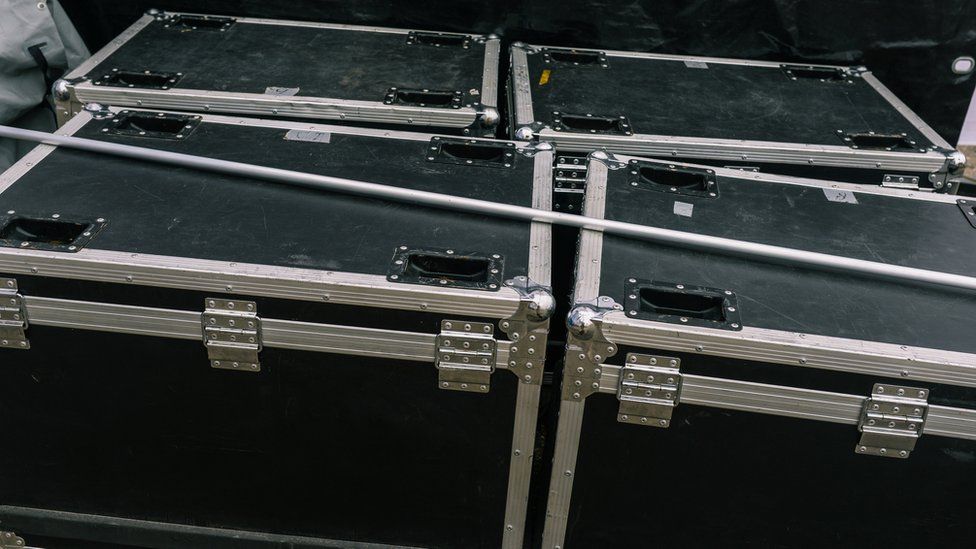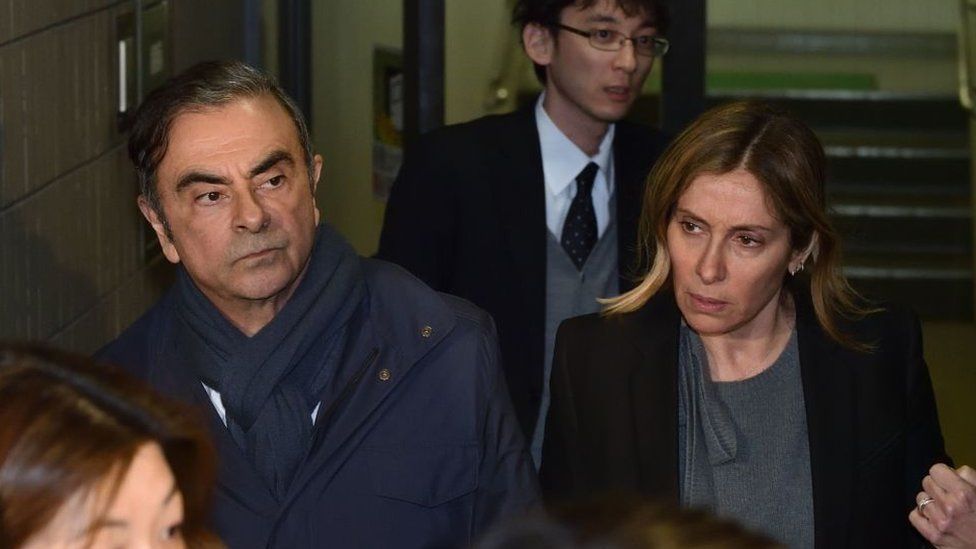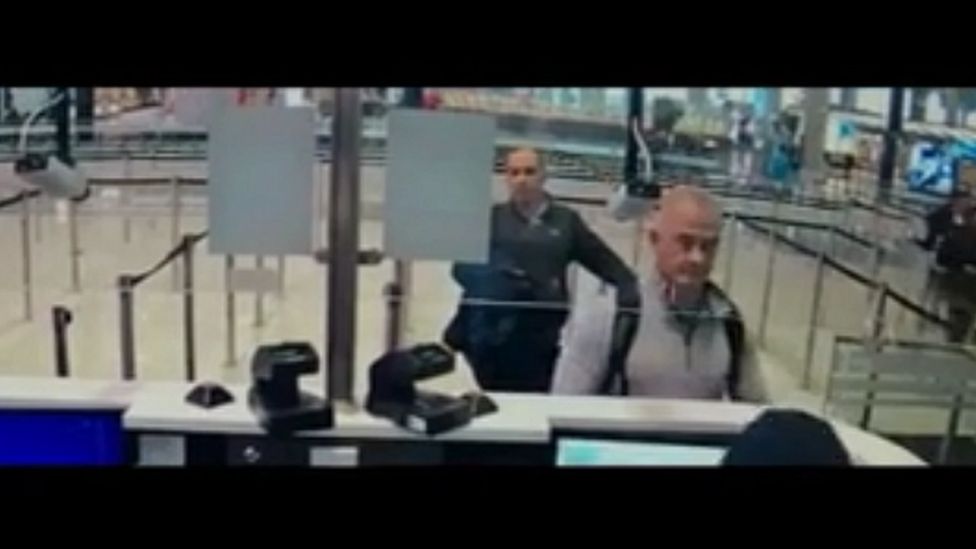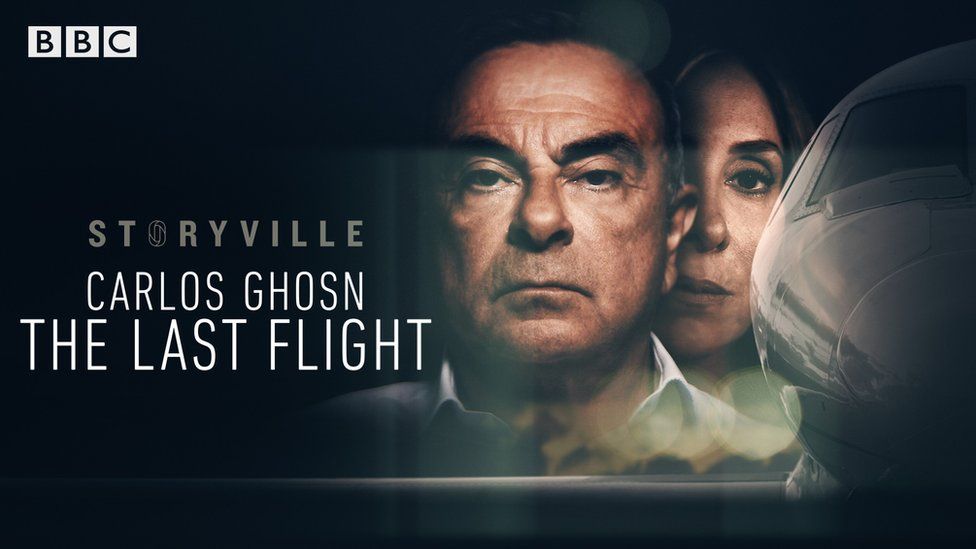At 10.30pm on a cold December night in 2019, a former titan of the global car industry lay bundled inside a box on board a plane, waiting to flee Japan.
"The plane was scheduled to take off at 11pm," recalls Carlos Ghosn.
"The 30 minutes waiting in the box on the plane, waiting for it to take off, was probably the longest wait I've ever experienced in my life."
Now, for the first time, the man who was once the boss of both Nissan and Renault has detailed his daring escape.
In an exclusive interview with the BBC, Mr Ghosn tells how he disguised himself to slip unnoticed through the streets of Tokyo, why a large music equipment box was chosen to smuggle him out of Japan and the elation he felt when he finally landed in his native Lebanon.
"The thrill was that finally, I'm going to be able to tell the story," he said.
Mr Ghosn was arrested in November 2018 over allegations by Nissan that he had understated his annual salary and misused company funds, which he denies.

At the time, Mr Ghosn was the chairman of the Japanese carmaker. He was also chairman of France's Renault and the boss of a three-way alliance between both carmakers and Mitsubishi.
His cost-cutting at Nissan - initially controversial - was ultimately seen to have saved the carmaker and he became a highly respected and recognisable figure. But he insists he was "collateral damage" in a fight back from Nissan against the increasing influence of Renault which still owns 43% of the Japanese company.
Documentary series Storyville details his extraordinary rise and sudden fall in Carlos Ghosn: The Last Flight which will be shown on BBC 4 on Wednesday 14 July.
'Shock, frozen trauma'
Describing the moment of his arrest at Toyko airport three years ago, Mr Ghosn said: "It's like you're being hit by a bus or something really very traumatic happened to you.
"The only memory I have of this moment is shock, frozen trauma," he said.
Mr Ghosn was taken to the Tokyo Detention Centre where he was given prison clothes and confined to a cell. "All of a sudden I had to learn to live without the watch, without the computer, without the telephone, without the news, without the pen - nothing," he said.
For more than a year, Mr Ghosn spent long periods in custody or was held under house arrest in Tokyo after being bailed. It was not clear when a trial would take place - the fear was it could take years - and Mr Ghosn faced a further 15 years in prison if convicted, in a country which has a 99.4% conviction rate.
It was during a period of house arrest, when Mr Ghosn was told he would not be allowed to have any contact with his wife, Carole, that he decided to find a way out.

"The plan was I could not show my face so I have to be hidden somewhere," he said. "And the only way I could be hidden [was] to be in a box or be in a luggage so nobody could see me, nobody could recognise me and the plan could work."
He said the idea of using a large box that would normally contain musical instruments "was the most logical one, particularly that around this time there were a lot of concerts in Japan".
But how would someone once so famous - now infamous - in Japan be able to get from his home in the capital to an airport and make his escape?
The plan was, said Mr Ghosn, to behave as normally as possible on the day. "It should be a normal day where I have a normal walk with normal clothes, normal attitude and all of a sudden, everything change."
Mr Ghosn would have to swap the suits he'd worn for years as a high profile executive in the global automotive sector for something a little more casual. Think jeans and trainers.
"You can imagine I had to go places where I never been, buy clothes I've never bought," he said. "All of this was part of how do you give yourself a maximum of chance of being successful and absolutely not drawing any attention to yourself."
'The moment'
From Tokyo, Mr Ghosn travelled by bullet train to Osaka where a private jet was waiting at the local airport to depart. But first, the box, which was waiting for Mr Ghosn at a nearby hotel.
"When you get in the box, you don't think about the past, you don't think about the future, you just think about the moment," he said.
"You're not afraid, you don't have any emotion except the huge concentration on 'this is your chance, you can't miss it. If you miss it, you're going to pay with your life, with the life of a hostage in Japan'."
Mr Ghosn was transported from the hotel to the airport by two men, father and son Michael and Peter Taylor who were posing as musicians.
In all, Mr Ghosn reckons he was in the box for around an hour and a half, though it felt like it lasted "one year and a half".

The private jet took off on time, and Mr Ghosn - now free from his confines - flew through the night, swapped planes in Turkey before landing in Beirut the next morning.
Lebanon does not have an extradition treaty with Japan so Mr Ghosn has been allowed to remain there.
However, Americans Michael Taylor and his son, Peter, have since been handed over by the US to Japan and now face three years in prison for helping Mr Ghosn to escape.
Also facing jail is Greg Kelly, Mr Ghosn's former colleague at Nissan, who remains under house arrest in Tokyo over allegations he helped his former boss disguise his earnings. Mr Kelly denies the charges.
What of the people who have been left behind in Japan?
Mr Ghosn said: "I've been told that the end of [Greg Kelly's] trial will be probably by the end of this year. And then God knows what's going to be the results of this trial for, as I said, a bogus reason."
He added: "I feel sorry for all the people who are victim of the hostage justice system in Japan, all of them."


Pioneer, visionary, ego-maniac, outsider.
This part-Lebanese, part-Brazilian citizen of the world is all of these things.
He lived more like a head of state than a head of industry. A company party at the Palace of Versailles, coincidentally - he says - on his 60th birthday, saw him hold court with waiting staff dressed in pre-revolutionary garb.
As simultaneous head of Renault and Nissan - he was a lightning rod of unease for some at both companies. Those at Nissan feared he would oversee a French coup of the traditional Japanese business he saved. And those at Renault disliked his shunning of the establishment and appearance in the pages of Paris society magazines.
Any global chief executive has to be sensitive to political nuance. The fact that Carlos Ghosn, after nearly 20 years at Nissan, was totally blindsided by his arrest in Tokyo suggests he had lost touch with the organisations he was trying to bring closer together.
His story has everything: hubris, corporate and global politics and an escape-caper worthy of a Hollywood film. He insists he is a man more sinned against than sinning and is working with lawyers to clear his name.
Until then, he remains a once-big-fish in a small pond, living in exile and under armed guard in Beirut for the foreseeable future.
This is not the ending he was expecting in this extraordinary drama.

You can see the full programme on Storyville Carlos Ghosn: The Last Flight on BBC4 on Wednesday 14 July at 10pm or on the iplayer.

https://news.google.com/__i/rss/rd/articles/CBMiLGh0dHBzOi8vd3d3LmJiYy5jby51ay9uZXdzL2J1c2luZXNzLTU3NzYwOTkz0gEwaHR0cHM6Ly93d3cuYmJjLmNvLnVrL25ld3MvYnVzaW5lc3MtNTc3NjA5OTMuYW1w?oc=5
2021-07-13 21:00:43Z
CBMiLGh0dHBzOi8vd3d3LmJiYy5jby51ay9uZXdzL2J1c2luZXNzLTU3NzYwOTkz0gEwaHR0cHM6Ly93d3cuYmJjLmNvLnVrL25ld3MvYnVzaW5lc3MtNTc3NjA5OTMuYW1w
Tidak ada komentar:
Posting Komentar